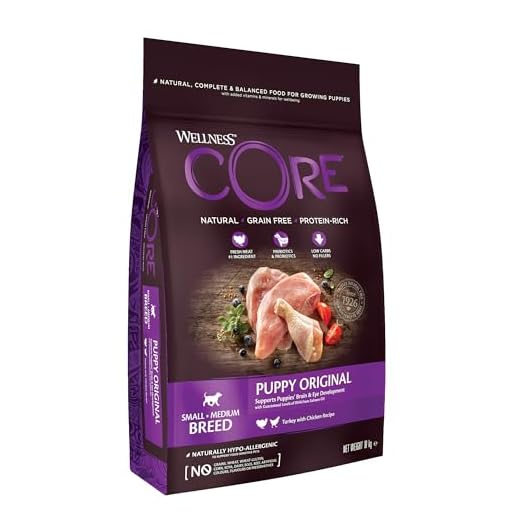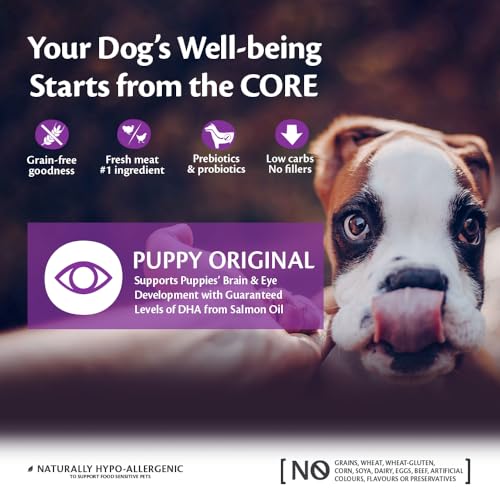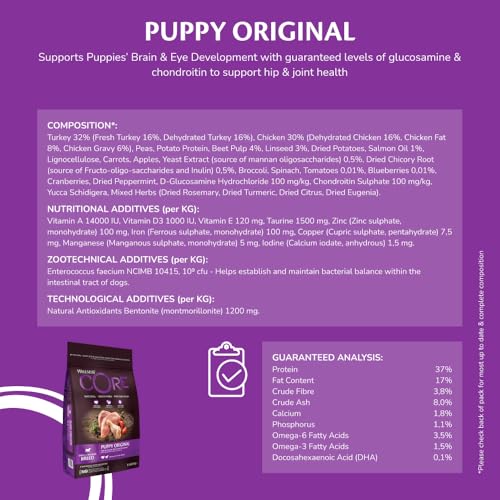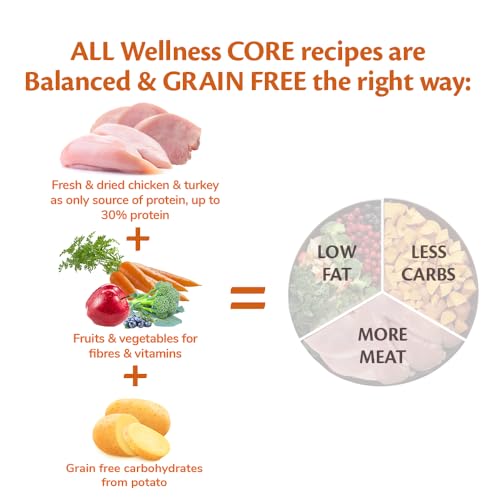




As a devoted pet owner, finding the best food for my puppy has been a journey filled with research and numerous trials. Puppies require a balanced diet rich in nutrients to support their rapid growth and development. I quickly realised that all natural dog food is not just a trend but a crucial component in ensuring my furry friend’s health and happiness.
In this article, I will share my insights and experiences in choosing the best all natural dog food for puppies. I’ll delve into the specific ingredients to look for, the benefits of an all natural diet, and some top brands that have stood out in the market. My aim is to help fellow pet owners make informed decisions that contribute to their puppies’ overall well-being.
Choosing the right food for a puppy can be overwhelming with so many options available. However, understanding what constitutes high-quality, all natural ingredients makes the process much simpler. From organic meats to wholesome grains and vegetables, the right combination can make a significant difference in your puppy’s health. I will also address common concerns and questions about transitioning to an all natural diet, ensuring you feel confident in making this important change.
Join me as I explore the world of all natural dog food for puppies, highlighting the best choices that can help your little companion thrive. This journey is about more than just feeding; it’s about nurturing a lifetime of health and vitality for our beloved pets.
Why Opt for All Natural Dog Food for Your Puppy?
When I brought my puppy home, I was determined to give him the best start in life. One of the most important decisions I faced was choosing the right food. After a lot of research, I realised that natural dog food was the way to go. It wasn’t just about feeding him; it was about nourishing him with wholesome ingredients.
Natural dog food means fewer additives and preservatives. This means my puppy is getting more of what he needs and less of what he doesn’t. The result? A happier, healthier dog with a shiny coat, bright eyes, and boundless energy. But it’s not just about immediate benefits; it’s also about long-term health.
Key Benefits of Natural Dog Food
- Better Digestion: Natural ingredients are easier for puppies to digest. This reduces the risk of stomach issues and ensures they absorb more nutrients from their food.
- Fewer Allergies: Many commercial dog foods contain artificial colours and flavours, which can trigger allergies. Natural food minimises this risk, keeping my puppy itch-free and comfortable.
- Improved Coat and Skin Health: High-quality natural ingredients, like omega-3 and omega-6 fatty acids, promote a shiny coat and healthy skin.
- Enhanced Energy Levels: Puppies are bundles of energy, and natural dog food provides the optimal nutrition they need to stay active and playful.
- Stronger Immune System: Ingredients rich in antioxidants, vitamins, and minerals help boost my puppy’s immune system, protecting him from illnesses.
Choosing natural dog food isn’t just a trend; it’s a commitment to my puppy’s well-being. I’ve seen firsthand how a diet rich in natural ingredients can transform his health and vitality. For anyone considering the best for their furry friend, natural dog food is a decision you won’t regret.
Essential Ingredients for All Natural Puppy Food
As a pet owner, I know the importance of feeding my puppy high-quality, all natural food. It’s not just about keeping them full, but ensuring they get the right nutrients to grow strong and healthy. Puppies have unique dietary needs, and selecting the right ingredients can make all the difference in their development.
When I search for the best natural food for my puppy, I look for ingredients that are not only wholesome but also beneficial for their overall health. Here’s a breakdown of the key ingredients I focus on to ensure my puppy gets the best start in life.
Key Ingredients to Consider
- High-Quality Protein Sources: Puppies need ample protein to support their rapid growth and development. I always check for high-quality protein sources like chicken, beef, lamb, or fish. These proteins are rich in essential amino acids, which are vital for muscle development and overall health.
- Whole Grains and Vegetables: For balanced energy levels, I prefer natural puppy foods that include whole grains such as brown rice, oatmeal, or barley. Additionally, vegetables like sweet potatoes, carrots, and peas provide essential vitamins, minerals, and fibre, promoting healthy digestion and a robust immune system.
- Healthy Fats: Healthy fats are crucial for my puppy’s brain development and coat health. I look for ingredients like chicken fat, fish oil, or flaxseed oil. These sources of omega-3 and omega-6 fatty acids support cognitive function and keep their fur shiny and skin healthy.
- Fruits: Incorporating fruits such as blueberries, apples, and cranberries provides natural antioxidants. These antioxidants are essential for protecting my puppy’s developing cells from damage and boosting their immune system.
- Calcium and Phosphorus: Puppies need these minerals for strong bones and teeth. I ensure the food contains an appropriate balance of calcium and phosphorus to support their skeletal development.
By focusing on these key ingredients, I can ensure that my puppy receives the nutrients they need to thrive. Selecting a high-quality, all natural diet is an investment in their future health and happiness.
Advantages of Grain-Free All Natural Puppy Food
When I first started looking into the best dietary options for my puppy, I discovered the significant benefits of grain-free, all-natural foods. It wasn’t just about providing a balanced diet but also about ensuring that my puppy received the most nutritious and healthful ingredients available.
Grain-free options are designed to mimic a more ancestral diet, which can be particularly beneficial for puppies. These foods often include higher levels of protein from meat and vegetables, promoting better growth and development. As a result, my puppy not only enjoys their meals more but also thrives with more energy and a shinier coat.
Key Benefits
- Improved Digestion: One of the most immediate benefits I’ve noticed is better digestion. Grain-free foods typically include ingredients that are easier on a puppy’s stomach, reducing the risk of digestive issues such as bloating and gas.
- Allergy Reduction: Many common grains found in dog foods, like wheat and corn, can be allergens. By eliminating these grains, the risk of allergic reactions is significantly decreased, leading to fewer skin irritations and itching.
- Better Nutrient Absorption: Without the presence of grains, the primary ingredients are often more nutrient-dense. This means my puppy can absorb and utilise more of the essential vitamins and minerals necessary for their development.
- Healthy Weight Maintenance: Grain-free foods often have a lower carbohydrate content, which helps in maintaining a healthy weight. This is crucial for puppies as it supports steady growth without the risk of becoming overweight.
- Increased Energy Levels: Higher protein levels provide sustained energy, which is especially important for active puppies. Since switching to grain-free food, my puppy has become more playful and energetic.
Choosing grain-free, all-natural food for my puppy has been a rewarding decision. It has not only improved their overall health but also ensured that every meal contributes positively to their growth and happiness. If you’re considering what to feed your puppy, I highly recommend looking into grain-free options for these compelling reasons.
How to Transition Your Puppy to an All-Natural Diet
When I decided to switch my puppy to an all-natural diet, I wanted to ensure the transition was as smooth and healthy as possible. Puppies have delicate digestive systems, and a sudden change in diet can cause unnecessary stress and digestive issues. Here’s how I managed the transition effectively.
Firstly, I chose a high-quality, all-natural puppy food that was specifically formulated to meet my puppy’s nutritional needs. It’s essential to select a product that lists natural ingredients without artificial additives or preservatives. Reading the labels carefully helped me make an informed choice.
Steps for a Smooth Transition
- Gradual Introduction: I started by mixing a small amount of the new food with my puppy’s current food. Each day, I increased the proportion of the new food while decreasing the old one. This gradual introduction over 7 to 10 days allowed my puppy’s digestive system to adjust without causing any upset.
- Monitoring: Throughout the transition period, I closely monitored my puppy for any signs of digestive distress, such as diarrhoea, vomiting, or loss of appetite. If any issues arose, I slowed the transition process to give my puppy more time to adapt.
- Consistency: Maintaining a consistent feeding schedule was crucial. I ensured that my puppy was fed at the same times each day, which helped to regulate his digestion and reduce any stress related to the dietary change.
Additional Tips
- Hydration: Ensuring my puppy had access to fresh water at all times was vital, especially when introducing new food. Proper hydration supports digestion and overall health.
- Positive Reinforcement: To make mealtime enjoyable, I used positive reinforcement. Praising and rewarding my puppy when he ate the new food helped him associate it with positive experiences.
- Veterinary Advice: Consulting with my veterinarian before making the switch provided me with valuable guidance tailored to my puppy’s specific health needs and ensured that the new diet was nutritionally complete.
By following these steps, I successfully transitioned my puppy to an all-natural diet. This careful and gradual process not only supported his health but also helped him thrive on his new, wholesome diet.
Reviews of the Best All Natural Dog Food Brands for Puppies
As a dedicated pet owner, finding the right natural food for my puppy has always been a priority. Puppies have specific nutritional needs to support their rapid growth and development, and providing them with high-quality, natural food is crucial for their health and wellbeing. Over the past few months, I have researched and tested several all-natural dog food brands, aiming to find the best options for my furry friend.
In this review, I will share my experiences with various brands, highlighting their ingredients, benefits, and my puppy’s reaction to each. My goal is to help other pet owners make informed decisions when it comes to choosing the best natural diet for their puppies.
Exploring Premium Natural Dog Food Brands
1. Orijen Puppy
Orijen Puppy stood out as a top choice due to its high protein content and rich variety of animal ingredients. Made with free-run chicken and turkey, wild-caught fish, and cage-free eggs, this formula mimics the natural diet of wild canines. My puppy seemed to thrive on Orijen, displaying increased energy levels and a shinier coat. The brand’s commitment to sourcing regional ingredients and avoiding artificial additives adds to its appeal.
2. Wellness CORE Puppy
Wellness CORE Puppy offers a grain-free formula that prioritises protein from high-quality sources like deboned chicken and turkey meal. The addition of DHA from salmon oil supports cognitive development, which is vital for growing puppies. I noticed my puppy’s digestion improved significantly on this diet, and he eagerly anticipated mealtime. Wellness CORE’s blend of fruits and vegetables, along with probiotics, ensures a balanced and wholesome diet.
3. Blue Buffalo Life Protection Puppy
Blue Buffalo Life Protection Puppy provides a well-rounded diet with its combination of real meat, whole grains, and garden veggies. This formula includes DHA for brain development and a precise blend of vitamins and minerals for overall health. My puppy enjoyed the taste, and I appreciated the brand’s commitment to natural ingredients without poultry by-products, corn, wheat, or soy. The LifeSource Bits, a blend of antioxidants and nutrients, are a unique feature that supports immune system health.
4. Merrick Grain-Free Puppy
Merrick Grain-Free Puppy is another excellent option, featuring deboned chicken as the primary ingredient, complemented by sweet potatoes, peas, and other wholesome ingredients. This formula is designed to support healthy growth with optimal levels of protein and fat. My puppy experienced noticeable muscle development and maintained a healthy weight on Merrick. The brand’s focus on locally sourced, natural ingredients without artificial preservatives was a significant factor in my choice.
5. Acana Puppy & Junior
Acana Puppy & Junior delivers a balanced diet with 70% animal ingredients, including free-run chicken, wild-caught fish, and cage-free eggs. This recipe supports muscle development and provides essential vitamins and minerals from natural sources. My puppy showed improved digestion and robust growth with Acana. The brand’s biologically appropriate philosophy, which mirrors the natural diet of dogs, resonated with my desire to provide the best nutrition for my pet.
In conclusion, selecting the right natural food for your puppy involves considering ingredients, nutritional balance, and your puppy’s individual needs. Each of these brands offers excellent options that can contribute to your puppy’s health and happiness. By choosing high-quality, natural dog food, you’re investing in your puppy’s future wellbeing.
Homemade vs Store-Bought: Which All Natural Puppy Food is Better?
As a devoted pet owner, I constantly find myself questioning whether homemade or commercially available natural puppy food is the better option. Each has its own advantages, and making an informed decision requires understanding the nuances of both.
Homemade puppy food offers the benefit of complete control over ingredients. I can ensure every component is fresh, organic, and free from preservatives or artificial additives. This level of control allows me to tailor the diet to my puppy’s specific needs, addressing any allergies or sensitivities directly. However, this approach demands a significant investment of time and knowledge to balance nutrients properly, ensuring the puppy receives all the necessary vitamins and minerals for healthy growth.
Advantages and Challenges of Store-Bought Natural Puppy Food
On the other hand, commercially prepared natural puppy foods are formulated by experts, ensuring a balanced and complete diet. These products undergo rigorous testing and adhere to nutritional standards, providing peace of mind that my puppy is getting a well-rounded diet. Additionally, the convenience factor cannot be ignored. Store-bought options save time and effort, especially for those with busy lifestyles.
However, not all commercial natural foods are created equal. Some may contain hidden fillers or lower quality ingredients, despite the “natural” label. It is crucial to research brands, scrutinise ingredient lists, and possibly even consult a veterinarian to choose the best product.
- Control over Ingredients: Homemade allows for full ingredient transparency, while store-bought relies on manufacturer honesty.
- Convenience: Store-bought is undeniably more convenient, saving preparation time.
- Expert Formulation: Commercial foods are designed by nutrition experts, ensuring dietary balance.
- Quality Assurance: Store-bought foods undergo strict quality controls, which can be a challenge to replicate at home.
In conclusion, the choice between homemade and store-bought natural puppy food hinges on personal circumstances and priorities. If time, knowledge, and a desire for complete control over ingredients are paramount, homemade food may be the way to go. Conversely, if convenience and the assurance of expert formulation are more critical, then opting for a high-quality commercial natural puppy food is likely the better choice.
Understanding Labels on All Natural Puppy Food
When selecting food for my puppy, understanding the labels on natural dog food products is crucial. These labels provide vital information about the ingredients and nutritional value, ensuring that my puppy receives a balanced and healthy diet. However, the terminology can often be confusing, making it challenging to determine the best option for my puppy’s needs.
To navigate this effectively, I focus on a few key aspects. First, I look for clear indications that the food is genuinely all-natural. This means the ingredients should be minimally processed and free from artificial additives, preservatives, and fillers. Knowing what each term on the label means helps me make an informed decision about my puppy’s diet.
Key Components to Look for on Labels
When examining the labels, several components are particularly important:
Ingredients List
- Whole Foods: I prioritise products that list whole foods, such as chicken, beef, or vegetables, as the first ingredients. These indicate that the primary source of nutrients comes from natural, unprocessed foods.
- Protein Sources: High-quality protein is essential for my puppy’s growth and development. I ensure that the label specifies clear and recognisable protein sources rather than vague terms like “meat by-products”.
- Natural Preservatives: Natural options such as vitamin E (often listed as mixed tocopherols) and vitamin C (ascorbic acid) are preferable to synthetic preservatives.
Nutritional Adequacy StatementThis statement confirms that the food meets the established nutritional levels by AAFCO (Association of American Feed Control Officials). It reassures me that the food provides balanced nutrition suitable for puppies.
Guaranteed Analysis
- Protein Content: A high protein percentage is crucial for my puppy’s muscle development.
- Fat Content: Essential for energy and a healthy coat, the fat percentage should also be clearly stated.
- Fibre Content: Adequate fibre helps with digestion and maintaining a healthy weight.
By paying close attention to these details, I can confidently choose natural puppy food that supports my pet’s health and growth. Understanding these labels not only ensures that my puppy gets the best possible nutrition but also gives me peace of mind about the quality of the food I’m providing.
Frequently Asked Questions About All Natural Puppy Food
Here are some common questions regarding all-natural puppy food:
1. Is all-natural puppy food better than regular puppy food?
Yes, all-natural puppy food is often considered better because it contains high-quality ingredients without artificial additives, colours, or preservatives. These foods are formulated to provide balanced nutrition, which is crucial for your puppy’s growth and development.
2. Can all-natural puppy food help with allergies?
It can. All-natural puppy food usually avoids common allergens like artificial additives and fillers, which may trigger allergic reactions in some puppies. However, every puppy is different, so it’s essential to consult with a veterinarian if you suspect your puppy has food allergies.
3. How do I transition my puppy to all-natural food?
Transitioning your puppy to all-natural food should be done gradually over 7-10 days. Start by mixing a small amount of the new food with their current food and gradually increase the proportion of the new food while decreasing the old one. This helps prevent digestive upset.
4. Are there any downsides to feeding my puppy all-natural food?
While all-natural puppy food is generally beneficial, it may be more expensive compared to regular puppy food. Additionally, some puppies may take time to adjust to the new diet. Always monitor your puppy’s health and consult with a vet if you have concerns.
5. What should I look for in an all-natural puppy food?
Look for all-natural puppy foods with high-quality protein sources like real meat, whole grains, fruits, and vegetables. Avoid foods with artificial additives, by-products, and excessive fillers. Reading ingredient labels can help you make an informed choice.
Conclusion
In conclusion, choosing the best all-natural puppy food is crucial for your puppy’s health and well-being. By opting for all-natural options, you provide your puppy with essential nutrients without artificial additives or fillers. Remember to consult with your veterinarian to ensure the chosen food meets your puppy’s specific nutritional needs.
Best All Natural Dog Food For Puppies
Features
| Part Number | FTP15 |
| Model | 02SKFTP |
| Is Adult Product | |
| Release Date | 2011-04-14T00:00:01Z |
| Size | 1 count (Pack of 1) |
| Language | English |
Features
| Part Number | HARRPUP-18 |
| Model | HARRPUP-18 |
| Color | Turkey |
| Size | 18 kg (Pack of 1) |
Features
| Part Number | DPDC70 |
| Model | DPDC70 |
| Color | Puppy (Chicken, Salmon & Peas) |
| Size | 7 kg (Pack of 1) |
| Language | English |
| Price history for Grain-Free Puppy Food with Salmon | |
|---|---|
|
Latest updates:
|
|
Features
| Part Number | HARRGSFCP-10 |
| Model | HARRGSFCP-10 |
| Release Date | 2024-01-01T00:00:01Z |
| Size | 10 kg (Pack of 1) |
Features
| Part Number | 10773 |
| Model | 10773 |
| Size | 10kg |
| Language | French |
Features
| Part Number | 12231703 |
| Model | 12531981 |
| Release Date | 2014-05-23T00:00:01Z |
| Size | 1 count (Pack of 1) |
| Publication Date | 2014-05-23T00:00:01Z |
| Price history for Nutritious Dry Dog Food with Chicken | |
|---|---|
|
Latest updates:
|
|
Features
| Part Number | 500002 |
| Model | 500002 |
| Release Date | 2019-12-23T00:00:01Z |
| Size | 14 kg (Pack of 1) |
Q&A:
What is the best all-natural dog food for puppies?
There are several great options, but one popular choice is “Acana Puppy & Junior” which is made with high-quality, all-natural ingredients tailored for puppies’ nutritional needs.
Are there any specific ingredients I should look for in all-natural puppy food?
Absolutely. Look for foods that contain real meat as the first ingredient, whole grains, fruits, and vegetables without artificial additives or fillers. Brands like “Orijen Puppy” and “Blue Buffalo Wilderness Puppy” are good examples.


















































